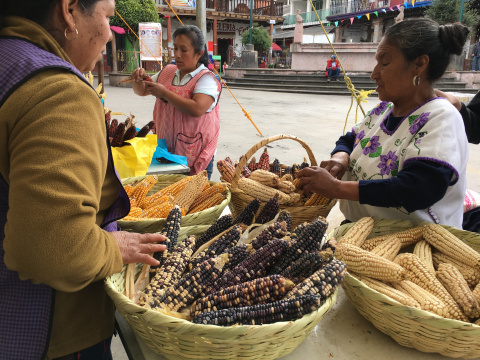Submitted by Veronica Villa on

As the COVID-19 health emergency unleashes a wider social and economic crisis, we believe that urgent action is indeed needed to safeguard global food security and nutrition. Action, however, cannot be limited to ensuring the flow of food supplies. A broader range of measures are necessary to ensure food security, in the COVID-19 crisis and beyond.
While governments must coordinate closely to guard against interruptions in food supplies which threaten access to basic nutrition, it is necessary to ensure that these measures do not undermine the food security, the health and the livelihoods of those who produce food for the world.
Closed borders and lockdowns have highlighted the extreme fragility of a food system in which 820 million women and men were chronically hungry and 2 billion food insecure before the COVID-19 crisis. Half of the world’s hungry people are food producers, peasant farmers and waged workers in agriculture. Their extreme vulnerability in the current crisis is the result of the systematic denial of their basic rights: the right to a safe workplace, the right to potable water and decent sanitation and housing, the right to form unions and bargain collectively, the right to health care and social security protection. These rights need to be on the G20 agenda, and not simply as crisis measures. The wealthiest countries in the world depend for their food on the labour of millions of migrant workers. It is unacceptable that governments, in the rush to secure the flow of migrant workers, are failing to devote resources to protecting their health, safety and livelihoods, measures which are at the same time vital to mitigate against the spread of the virus.
Action to keep vital food supplies moving across borders must be accompanied by strict measures to curb financial speculation linked to food commodities, or we face a replay of the ‘food price crisis’ which accompanied the financial meltdown in 2008. Governments muddled through the immediate crisis and returned to business as usual. Both food and finance are now even more precarious and the world faces a new crisis of both, with potentially lethal consequences. Governments are implementing measures which were considered unthinkable only months ago. If G20 governments are banning short selling or conditioning financial support for business on refraining from dividend distributions and share buybacks, surely it is possible to restrict trading in agricultural futures to prevent a speculative bubble.
The urgent crisis measures should not distract from the equally urgent need to rebuild on new foundations a food system which is strip mining the soil, polluting water, rapidly destroying biodiversity, driving the climate crisis and incubating future pandemics. The food system is highly vulnerable to shock because of its dependence on external inputs and long supply chains. Local food systems cannot thrive when farmers are discouraged from saving and exchanging seeds. Shocks are amplified when national systems of food reserves are dismantled under pressure, even though these reserves never enter into international trade. The world can lurch from crisis to crisis, or we can begin now to start building the resilient, sustainable food system the world desperately needs.
In many rural areas, border closings and the loss of export markets have plunged entire communities dependent on agriculture into overnight destitution; essential services have collapsed. Targeted support for these communities is urgent, and it should include immediate support for rebuilding local food production in ways which protect the rights of peasant farmers and agricultural workers.
We urgently need a coherent global policy response coordinated from the UN Committee on World Food Security. Trade unions, peasant organizations and civil society organizations, many of them active in the Committee on World Food Security, have consistently defended food sovereignty on the understanding that the universal right to food is inseparable from rights for food producers. Existing human rights instruments – among them the Universal Declaration on Human Rights, the International Covenant on Economic, Social and Cultural Rights, the United Nations Declaration on the Rights of Indigenous Peoples, the Conventions of the ILO, the United Nations’ Declaration on the Rights of Peasants and Other People Working in Rural Areas – provide a foundation for concrete action to ensure the right to food. The task is to secure their implementation if we are to take the full measure of the present crisis and prevent new ones.
Kirtana Chandrasekaran, International programme coordinator - Food Sovereignty, Friends of the Earth International
Mauro Conti, President, Centro Internazionale Crocevia
Prof. Olivier De Schutter, former Special Rapporteur on the right to food (2008-2014), Co-chair, International Panel of Experts on Sustainable Food Systems
Fiona Dove, Director, The Transnational Institute
Paula Gioia, International Coordination Committee, La Via Campesina
Shalmali Guttal, Executive Director, Focus on the Global South
Judith Hitchman, President, Urgenci
Sue Longley, General Secretary, IUF
Sofia Monsalve, Secretary General, FIAN International
Rosa Pavanelli, General Secretary, Public Services International
Tammi Jonas, Australian Food Sovereignty Alliance
Stefano Prato, Managing Director, Society for International Development
Jim Thomas, Co-Executive director, ETC group
| Attachment | Size |
|---|---|
| 196.39 KB |
